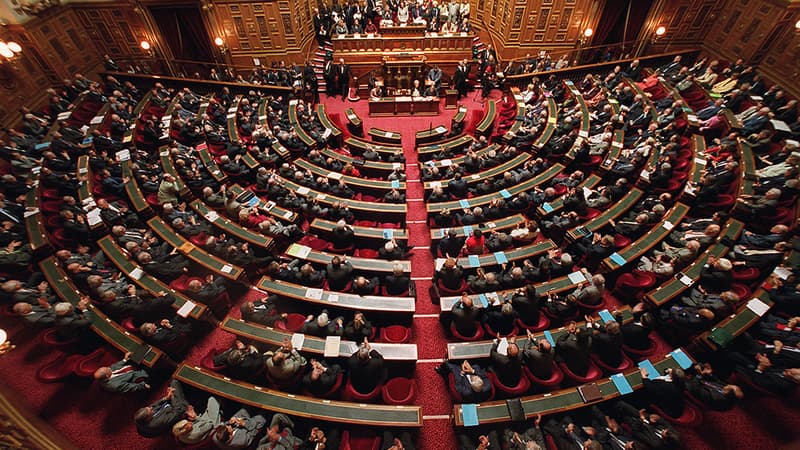Now it is the turn of the senators to deepen the pension reform, in an environment that is a priori much duller than in the National Assembly. The text arrives this Tuesday at the Luxembourg Palace, first in the Social Affairs Committee, before heading to the Chamber on Thursday.
The senatorial left intends to throw its forces into battle to bring down the government, while distinguishing itself from the sometimes chaotic debates at the Palais-Bourbon.
“We are going to do everything possible so that Emmanuel Macron finally listens to the millions of French who oppose this reform with our method, which is to say things forcefully but calmly,” summarizes Patrick Kanner, the president of the socialist group, to BFMTV. . com.
Senators who “can change”?
At the center of the strategy drawn up collectively by the PS, environmental groups and communists: achieve -unlike the deputies- debate the very emblematic article 7 that raises the retirement age to 64 years, but not before March 7. The unions, which called to “paralyze France” that day, expect a massive mobilization to move political lines.
“There are senators among the centrists who can change by being sensitive if millions of French people are on the streets,” said PS Senator Marie-Noëlle Lienemann.
In a chamber that has barely twenty Renaissance senators, the left considers it possible to defeat the executive. With some optimism, given the composition of the Senate, which is mainly on the right – the LR group alone has more than 40% of the seats. And the senators have already voted several times amendment introduced by Senator René-Paul Savary that delays the retirement age retired at age 64.
Bruno Retailleau, the head of the LR group, has already worn the color in the columns of the Parisian this weekend, indicating “they wish to vote” on the pension reform, “after having modified it”. In 2017, the elected representative of the Vendée even campaigned in favor of François Fillon advocating for the lowering of the legal age of departure to 65 years.
The right-wing deputy Aurélien Pradié, who crossed swords against the reform in the Assembly, does not have strong support in the Luxembourg Palace. Not to mention that with the senatorial elections approaching next September, LR senators must avoid getting angry with the party, in charge of distributing the candidacies.
The left more united than in the Assembly
The left, however, considers that it has a few tricks up its sleeve. Starting with a common strategy. Where the Nupes were divided during the debates in the chamber on whether or not to multiply the amendments, the communists, socialists and environmentalists will form a common front in the Senate.
La France insoumise does not have a group in the Luxembourg Palace and the Nupes, launched during the last legislative elections last June, have no real existence on rue de Vaugirard – which did not prevent Jean-Luc Mélenchon’s movement from calling the senators to “do everything possible to prevent the passage of retirement at 64” in the Senate.
To the chagrin of most of them who did not appreciate the method. “Thanks for the advice, we hadn’t thought of that yet. What a good idea,” socialist-elect Laurence Rossignol scoffs.
“Nobody liked this way of doing things and here we all agree on a point that seems crucial to us: that of not going to the end of the text,” says Eliane Assassi, president of the communist group.
The National Assembly did not get to examine the entire text either: the deputies even stopped at article 2, for a text that has 20.
Larcher to lead the discussions
Suffice it to say that the Government would find itself in a particularly delicate political situation if neither of the two chambers of Parliament finally voted in favor of the pension reform, a situation without precedent in the history of the Fifth Republic.
To achieve this objective, the union of the left intends to rely on the classics of parliamentary debate to save time, between procedural motions, speaking before each article and each amendment. Senators also intend to ask for explanations of vote before each vote.
But the rules of the Senate are more restrictive and can force the debates to be accelerated by virtue of its article 38 that limits the intervention “in the entirety of an article or in the explanations of vote on an amendment” to two speakers “of contrary opinion” , the left hardly believes in it. He even bets on Gérard Larcher, the president of the Senate, but LR.
“I dare not believe that he would use this article, he who presents himself as a defender of social dialogue and who always says that he wants to defend the rights of Parliament”, screams the president of the environmental group, Guillaume Gontard.
The government can speed up
But the government has one last tool to expedite the debates: Article 44 of the Constitution. This provision allows the government to force the Senate to “decide by single vote on all or part of the text, keeping only the amendments proposed or accepted by the government.”
“It is a political tool that is far from neutral. I warn against any desire to prevent Parliament from doing its job,” replies Socialist senator Laurence Rossignol, a former minister of François Hollande.
Enough to convince the executive not to enter this field? The Minister of Labor Olivier Dussopt is currently practicing the soft method. On BFMTV this Sunday, he said he was “in favor of all groups being able to contribute” to enriching pension reform in the Senate.
Source: BFM TV


